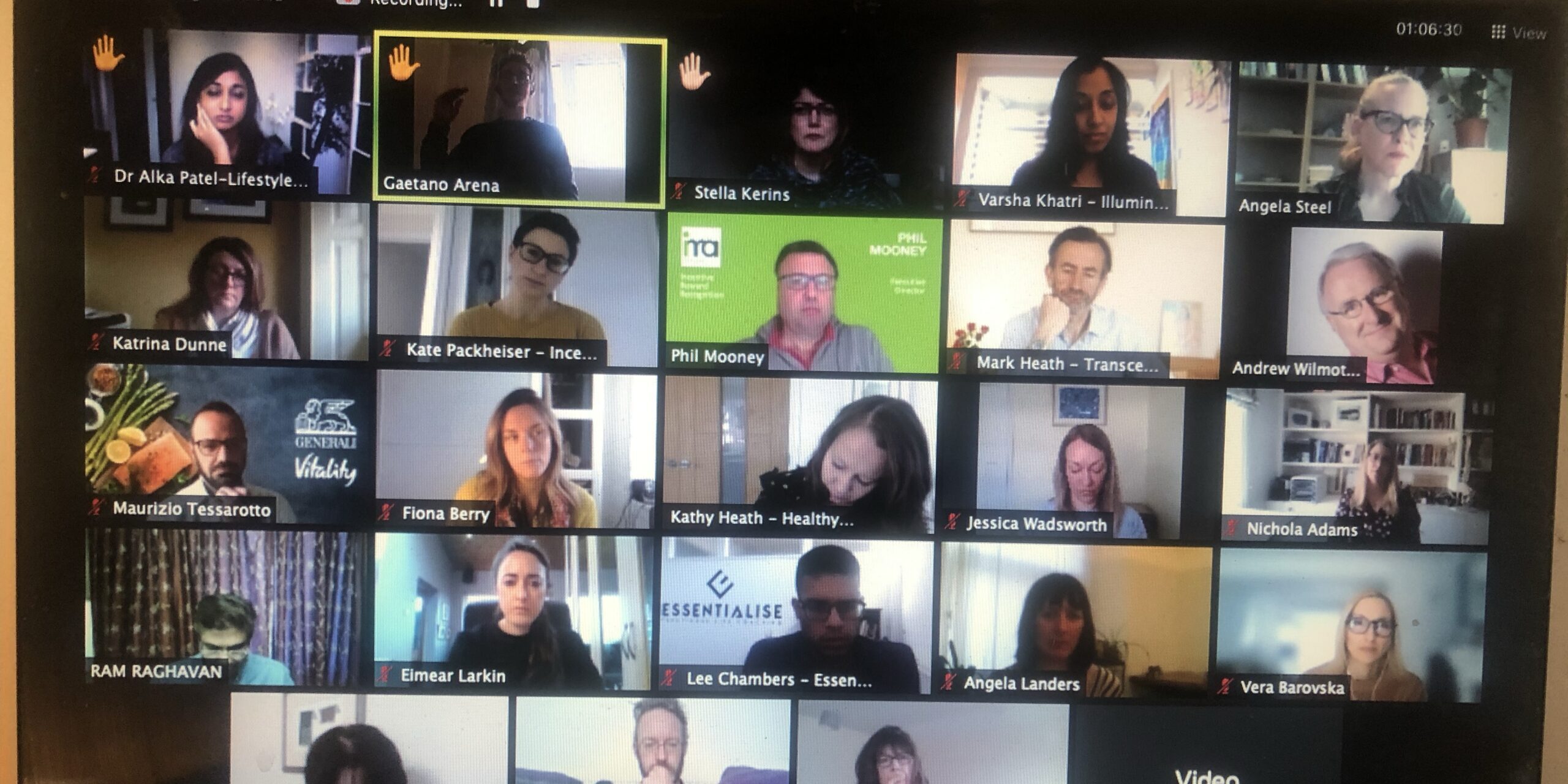Over 25 wellbeing experts, industry practitioners, champions, current & potential new providers came together to discuss: “Is a new Workplace Wellbeing Professional Association a good idea?” The answer was a resounding ‘yes’. Join our Linkedin Group: http://bit.ly/wwsalink
The session was kicked off by Andrew Wilmot – TM Wellbeing, Kathy Heath – The Healthy Minds Club, , Mark Heath – Transcendental Meditation, Angela Steel – SuperWellness, & Varsha Khatri – Illuminated Health.
We were delighted that the following also posed questions: Phil Mooney, the Executive Director of the trade association for employee engagement IMA Europe, Dr Ram Raghaven of the Kaya Wellbeing Index, Katrina Dunne, The Wellbeing Card, and Wendy Carter, Founder of the Incentive Awards.
The overall theme of the session is that employers need a wellbeing approach that focuses on prevention and personal development rather than just a ‘First Aid’ or ‘Tick-in-the-box’ approach.
Q1: The meeting felt that the coverage of the association should be as follows:
- EMEA for providers, and UK chapter for everyone else 41%
- UK & Ireland for all roles 24%
- EMEA for all roles 24%
- UK only for all roles 12%
We need to provide tools to those that are planning strategies. There is so much already going on in HR. HR managers, line management & champions need the support of a specialist association. We need to look at solutions that cover both working from home and from the office.
Employers are raising awareness of wellbeing. But they are overwhelmed with lots of random information and too many different modalities. There are no tools which measure whether or not you are winning. Everything is done blindly. There are some measurement tools, but they need to be validated and evidence based. There needs to be proper modelling. There is not an existing way of providing proper tools to support employers.
Q2: The meeting rated the importance of the following audiences as follows:
- Wellbeing Experts 94%
- Wellbeing product providers companies 65%
- Wellbeing service provider companies 59%
- Employer practitioners 59%
There is an absence of real wellbeing initiatives and terminology is important. Many employers have a lot of papers and planning, but not much implementation and delivery.
Our strapline should be Workplace Wellbeing – Strategy, Delivery and Measurement.
There needs to have validated tools/research/trials/information and the ability to put across the right messages. There is a minefield of resources of unknown quality on the web. Drop-in events alone are a false economy and small charities/businesses cannot always afford wellbeing initiatives.
We should work closely with other non-profits but the feeling was that there was not a huge amount of overlap with other organisations.
- https://www.wellbeingcharter.org.uk
- https://engageforsuccess.org/
- https://www.mind.org.uk/workplace/workplace-wellbeing-index/
We should look for Government funding to support a thorough measurement framework and it’s testing. There is very little focus on prevention and looking at the person holistically. Wellbeing is very much reactive at the moment – looking at helping people after they are already “ill” or not feeling well. Companies that take their wellbeing strategy seriously in order to see a greater improvement in employee wellness.
We need measurement tools need to show the Return on Investment to companies. We need to see the ROI on year 1, 3, 5, etc. to see what is actually working and what is fit for purpose for the specific sectors. The whole marketplace needs measurability and needs to demonstrate that Wellbeing will hit companies bottom line as a business.
Q3: The meeting rated the features of the proposed association as follows:
- Measurement framework 72%
- Directory of experts 67%
- Accreditation of experts 56%
- Directory of provider companies 50%
- Training on corporate wellbeing selling, delivering & buying 50%
- Code of conduct for experts 39%
- Wellbeing employee champion start up kit 39%
- Employer practitioner strategy tool kit 39%
- Accreditation of provider companies 33%
- Code of conduct for provider companies 17%
Employees have different problems to solve and it can be challenging for employers to know what to put in place, so it should be possible to tailor a strategy around specific organizational needs.
We should engage in high level government lobbying. It shouldn’t be just the responsibility of the individual. Wellbeing needs to have a solid structure within the environment and workplace. How do you work it into manager appraisals and company KPIs and outcomes. It needs to be embedded into the culture and part of the onboarding process, and with a well-formed strategy behind that.
We need tools to help employers and wellbeing champions know that an expert is truly qualified and have a curated list/directory of professionals that can be used for strategy, education, measurement and delivery.
Q4: The meeting felt that the following disciplines of experts should be included within the organization:
- Lifeskills – debt management, stress, time management, etc 76%
- Meditation 65%
- Counselling 59%
- Yoga 47%
- Personal fitness training 47%
- Psychotherapy 47%
- Counselling & CBT 47%
- Wellbeing products – experiences, gift cards, payment cards 41%
- Nutrition 35%
- Hypnotherapy 29%
Overwhelmingly the meeting voted to stay in touch via a LinkedIn group:







